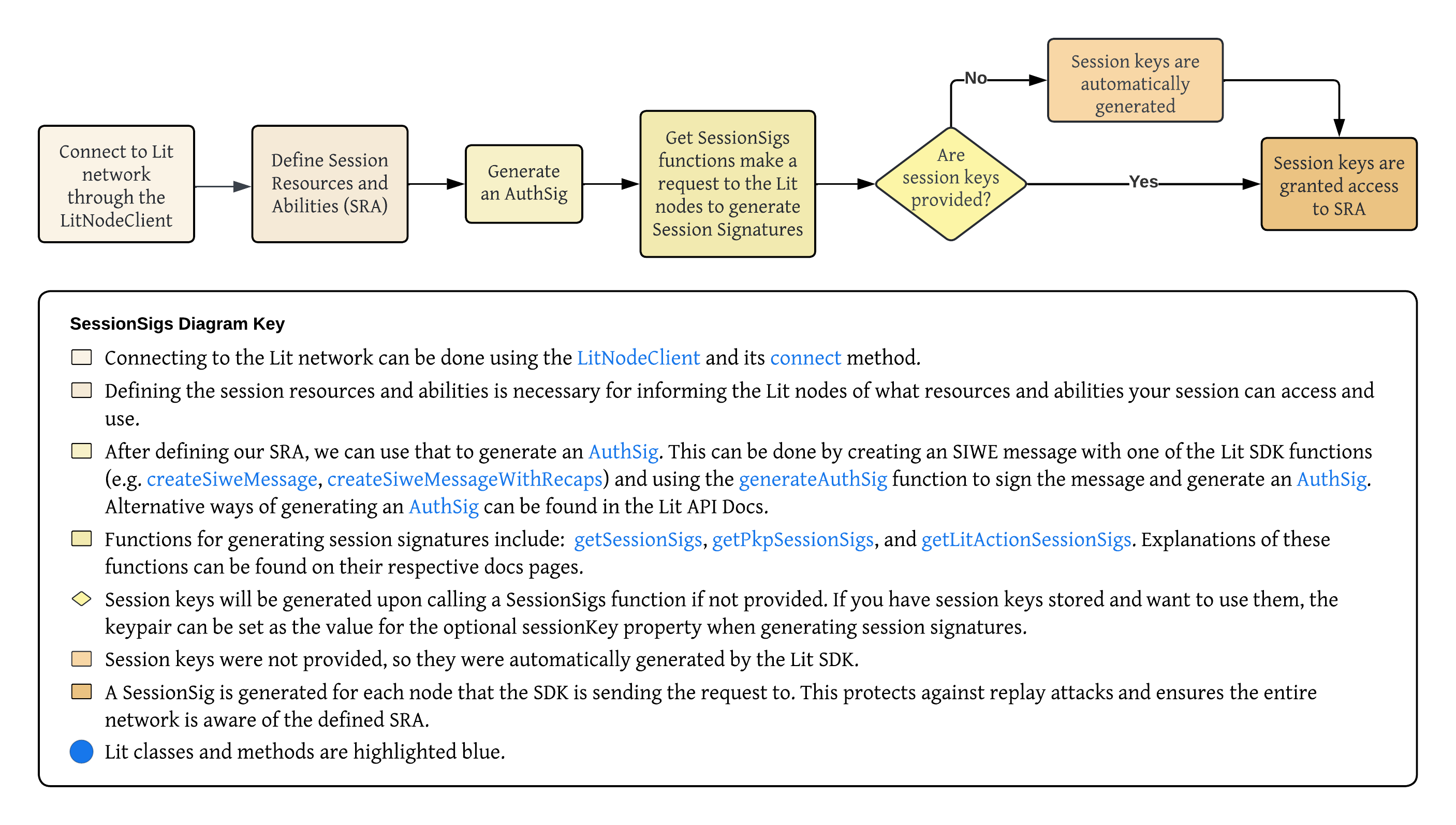Session Signatures
Please do not cache Session Signatures, and instead generate them on-demand.
Session Signatures are used to authenticate with the Lit nodes and create a secure connection to the Lit network.
Generating a Session Signature is required whenever you want to request a specific Lit Ability (e.g. signing a transaction) for a particular Lit Resource (e.g. a PKP).
Session Signatures are created using session keys, which are generated for you when you initiate a connection with the Lit network via the Lit SDK. These session keys are unique ed25519 keypairs generated locally by the Lit SDK. They are used to sign all requests to the Lit network during the current session.
While session keys and their signatures facilitate ongoing communication during a session, an AuthSig (Authentication Signature) is used to verify your identity and authorization to the Lit nodes.
An AuthSig is an ERC-5573 Sign-In with Ethereum Capabilities message. It specifies the authorized Lit Resources and Lit Abilities of the session.
The AuthSig allows Lit nodes to verify your authorization to perform actions like decrypting data, signing transactions with a PKP, or executing Lit Actions. When you make a request, each Lit node checks your AuthSig to confirm that your request aligns with the capabilities you previously defined. This ensures that only authorized users can perform specific actions within the Lit network. This authentication system maintains the security and integrity of the Lit network.
For detailed explanations of this setup, please refer to our Security Considerations page.
SessionSigs Generation Diagram

Paying for Usage of the Lit Network
You can facilitate payment for usage the Lit network within Session Signatures. You can read more about paying for usage here, and paying using Session Signatures here.
Storing SessionSigs
Running in a Browser
Session data is automatically stored in the browser's local storage, and no additional configuration is needed.
Running in a Node.js (or Similar) Environment
A storageProvider needs to specified when creating an instance of the LitNodeClient. You decide how this implemented, but the following is an example of using LocalStorage from the node-localstorage package:
import { LocalStorage } from "node-localstorage";
import { LIT_NETWORK } from "@lit-protocol/constants";
litNodeClient = new LitNodeClient({
litNetwork: LIT_NETWORK.DatilDev,
// This storageProvider object can be omitted if executing in a browser
storageProvider: {
provider: new LocalStorage("./lit_storage.db"),
},
});
If an instance of LocalStorage is not provided as the storageProvider, a new session keypair will be generated each time the code runs instead of reusing previously generated signatures and keys.
Manually Generating Session Keys
In addition to the automatic generation of session key pairs, you can manually generate a session key pair using the generateSessionKeyPair() function. This provides greater control over session management, especially in environments where custom handling of keys is necessary, such as server-side applications.
When a session keypair is generated, it includes both a public key and a private key (using the Ed25519 algorithm). These key pairs are unique for the user’s device, ensuring that the session remains secure to that environment.
Note:
In a browser environment, the session key is automatically stored in local storage
lit-session-keyfor later use, allowing persistent sessions without needing to regenerate the key each time.In a Node.js or similar environment, you need to specify a custom
storageProviderto store and retrieve the session keys. Without this, a new keypair will be generated each time the session is initialised.
If no session key is provided, the SDK will automatically generate a new one. However, manually generating and managing session keys provides more control, especially if you want to cache or persist them securely across different environments.
Resources you can Request
You can pass an array of resourceAbilityRequests to any of the functions that generate Session Signatures. These requests define the scope of actions the session key can perform.
The requested resources and abilities must be either equal to or a subset of the capabilities specified in the session capability object within the AuthSig. A session key cannot have more privileges than those originally granted by the authentication signature.
When session capability objects are omitted from functions generating Session Signatures, the SDK defaults to creating a session capability object with maximum permissions (i.e. can use any Lit Resource with any Lit Ability that the signer of the AuthSig owns). This should only be done when debugging, as allowing unspecified access control conditions is a security vulnerability.
Read more here about how to create custom session capability objects.
Not finding the answer you're looking for? Share your feedback on these docs by creating an issue in our GitHub Issues and Reports repository or get support by visiting our Support page.